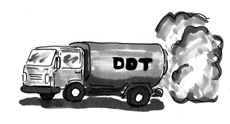Opinion: Weighing the costs

David Chen
October 11, 2004
My father once told me a morbidly amusing story from his youth. When he was young, pesticide trucks would drive through Chicago neighborhoods to eliminate mosquitoes, spraying a cloud of DDT. While the truck driver told everyone to go inside, the boys would ready their bikes. The game was to see who could ride farthest into the thick cloud of chemicals spewing from the truck. The “cool” kids were barely visible in this gaseous game of chicken.
My father and his friends still are alive. Sadly, almost 100 million people are not. They died not because of DDT but from the lack of it.
“This is like loading up seven Boeing 747 airliners each day, then deliberately crashing them into Mt. Kilimanjaro,” said Dr. Wenceslaus Kilama, Malaria Foundation International Chairman. This is 3 million people per year, 8 thousand per day or about one person every 15 seconds. In fact, the annual death toll from malaria in sub-Saharan Africa is comparable to the total toll from AIDS over the past 15 years combined.
Malaria is primarily spread by mosquitoes, the vermin that DDT eliminates best. DDT is cheap, long-lasting, and effective. So why is it illegal to use in almost any context?
Rachel Carson’s 1962 book, Silent Spring, argued that DDT would spell the end of humankind. The use of pesticides would breed resistant super-
Get The Daily Illini in your inbox!
insects, resulting in even more pesticide use. These cancer-causing pesticides would work their way up the food chain, and eventually, everyone would starve (or perhaps succumb to the super-insects). She even cited rising cancer rates over the previous 20 years as evidence to support her theory.
The problem with the book was that its foundation was rooted in junk science. Correlation does not necessarily mean causation. Other possibilities for higher cancer rates such as increased tobacco use or ever-increasing life spans were not considered. There absolutely is no scientific data to back up the assertion that DDT causes cancer (or breeds super-insects). Furthermore, the claim that DDT harmed bird populations was suspect at best. In the late 1960s, at the height of DDT use, many bird populations increased – likely due to the reduced spread of insect-borne bird diseases like West Nile.
Despite Carson’s dubious claims, her cause was taken up by the burgeoning environmentalist movement of the time. In 1972, the use of DDT was banned in the United States, but the crusade had just begun. In recent years, many international agreements have been predicated on banning DDT. For example, Mexico was forced to quit its use in order to sign NAFTA. Additionally, it is illegal for U.S. foreign aid funds to be used for DDT.
When confronted with the above indictments of banning DDT, some proponents of the ban will respond by saying that population control is a good thing, claiming that it’s fine that so many people in the tropics die, because people are the problem anyway. According to Sierra Club director Michael McCloskey, “Sierra Club wants a ban on pesticides … [because by] using DDT, we reduce mortality rates in underdeveloped countries without the consideration of how to support the increase in populations.”
Despite being brutally heartless, these notions also fly in the face of science. Modern technology has ensured that there is ample food supply for the ever-increasing global population. Starvation has – nearly without exception – resulted from distribution problems.
What’s more, those outspoken environmentalists of the past who predicted a population explosion and subsequent implosion with death by the billions have been proven so wrong that their writing should be irrelevant today.
Environmental activists are losing sight of the end result. If the goal of environmentalism is to save the world for future generations, then why are we conceding the deaths of millions each year to DDT? There are costs to DDT, but we must weigh those costs against the costs of human life.
DDT could save lives now, but will it really create problems for us in the future? We owe it to humanity to find out for sure.
David Johnson is a senior in business. His column runs alternate Mondays. He can be reached at [email protected]






